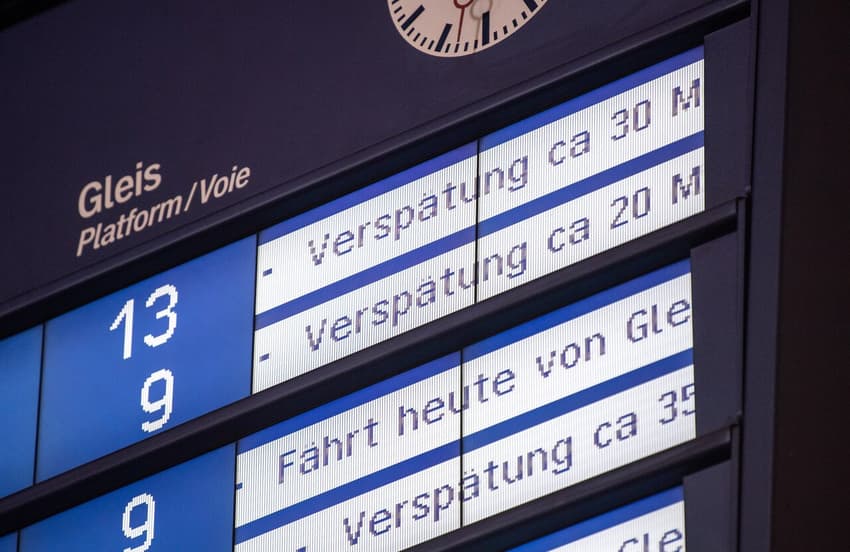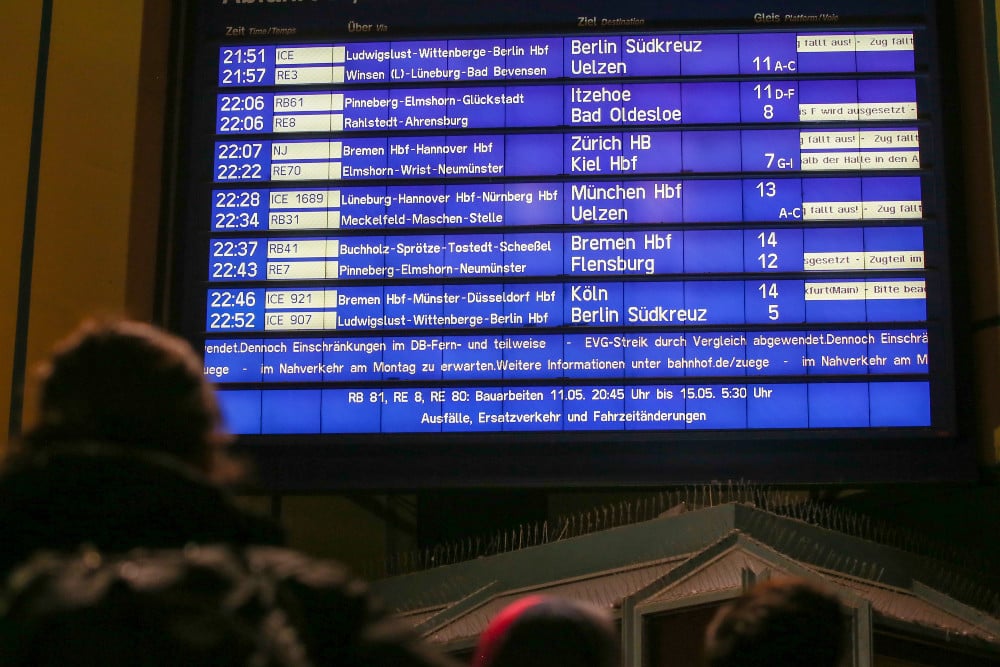Germany tightens rules for claiming compensation for delayed trains

A new EU regulation coming into force Wednesday claws back a few rights to compensation for delayed or cancelled trains in Europe, including Germany.
Travellers on German state railway Deutsche Bahn have fewer legally guaranteed rights to compensation for cancellations or delays starting Wednesday.
However, although the EU regulation tightens passenger rights so that train companies don’t legally have to provide as much compensation as before, DB does say its opting to offer more than what the law technically requires.
At the moment, DB has to pay you back 25 percent of the cost of your ticket if your train is delayed by more than an hour but less than two hours. If your train is delayed by more than two hours, it has to pay you back 50 percent of the cost.
This rule stays in place. But some exceptions are coming in as to when it applies.
READ ALSO: What are my rights if a train is delayed or cancelled in Germany?
Is it the railway’s fault?
This is the big question in the new regulation determining whether passengers get compensation or not.
If a European railway, including DB, can argue that the delay or cancellation is due to something they have no control over, then the passenger no longer has the right to compensation.
What are these events exactly?
A police operation that disrupts traffic would qualify as being something that DB has no control over. So too, would delays directly attributable to extreme weather, for example.

Strike-related delays and cancellations remain covered under tightened passenger rights regulations. Photo: picture alliance/dpa | Bodo Marks
Strikes, however, don’t technically constitute something that DB has no control over. So the railway still has to pay compensation if a strike delays or cancels your travel plans.
DB has so far said that it will keep its current compensation policies more or less in place and may end up refusing to pay compensation only in the event of extreme weather delays. Even then, it says it will show “goodwill” – although it’s not quite clear what this means.
DB remains responsible to pay alternative buses for travellers who are delayed for more than 100 minutes, to bring them back to their origin station free of charge, or to provide them with food, drinks, or overnight accommodation.
Shorter claims times
One thing that will change is the time that passengers have to claim compensation. Previously, European train operators had to process claims from people filed up to a year after the delay or cancellation originally took place.
This is now being reduced to three months. DB says it will continue to process claims received later, although anything filed after three months in the future remains at their discretion, rather than a legal requirement.
READ ALSO: Delayed train? Germany’s Deutsche Bahn to give online refunds for first time
Comments
See Also
Travellers on German state railway Deutsche Bahn have fewer legally guaranteed rights to compensation for cancellations or delays starting Wednesday.
However, although the EU regulation tightens passenger rights so that train companies don’t legally have to provide as much compensation as before, DB does say its opting to offer more than what the law technically requires.
At the moment, DB has to pay you back 25 percent of the cost of your ticket if your train is delayed by more than an hour but less than two hours. If your train is delayed by more than two hours, it has to pay you back 50 percent of the cost.
This rule stays in place. But some exceptions are coming in as to when it applies.
READ ALSO: What are my rights if a train is delayed or cancelled in Germany?
Is it the railway’s fault?
This is the big question in the new regulation determining whether passengers get compensation or not.
If a European railway, including DB, can argue that the delay or cancellation is due to something they have no control over, then the passenger no longer has the right to compensation.
What are these events exactly?
A police operation that disrupts traffic would qualify as being something that DB has no control over. So too, would delays directly attributable to extreme weather, for example.

Strikes, however, don’t technically constitute something that DB has no control over. So the railway still has to pay compensation if a strike delays or cancels your travel plans.
DB has so far said that it will keep its current compensation policies more or less in place and may end up refusing to pay compensation only in the event of extreme weather delays. Even then, it says it will show “goodwill” – although it’s not quite clear what this means.
DB remains responsible to pay alternative buses for travellers who are delayed for more than 100 minutes, to bring them back to their origin station free of charge, or to provide them with food, drinks, or overnight accommodation.
Shorter claims times
One thing that will change is the time that passengers have to claim compensation. Previously, European train operators had to process claims from people filed up to a year after the delay or cancellation originally took place.
This is now being reduced to three months. DB says it will continue to process claims received later, although anything filed after three months in the future remains at their discretion, rather than a legal requirement.
READ ALSO: Delayed train? Germany’s Deutsche Bahn to give online refunds for first time
Join the conversation in our comments section below. Share your own views and experience and if you have a question or suggestion for our journalists then email us at [email protected].
Please keep comments civil, constructive and on topic – and make sure to read our terms of use before getting involved.
Please log in here to leave a comment.